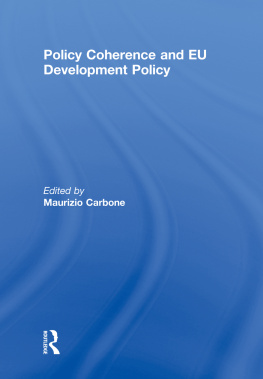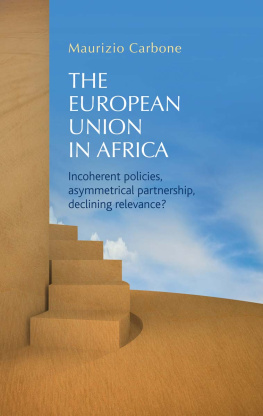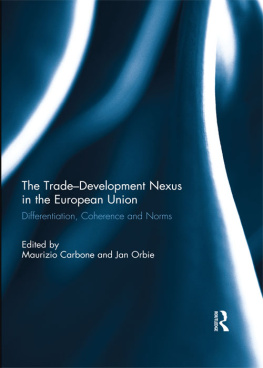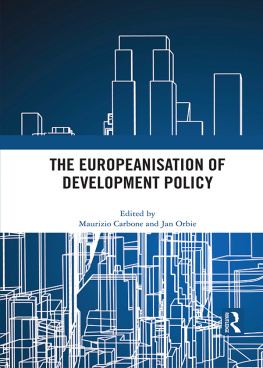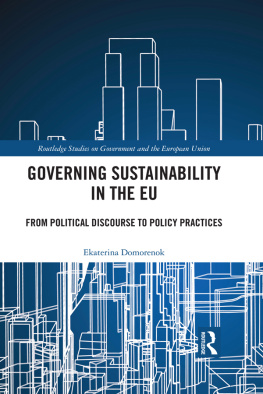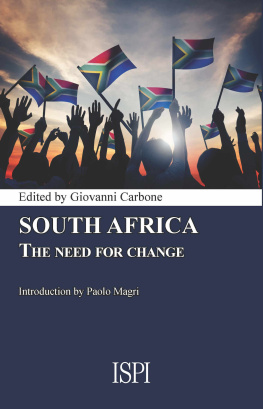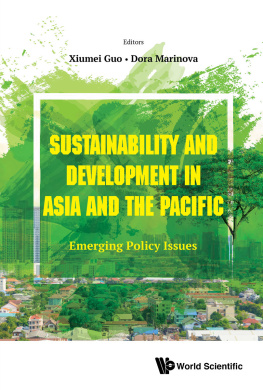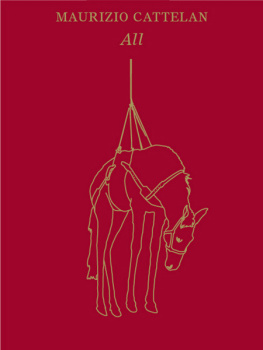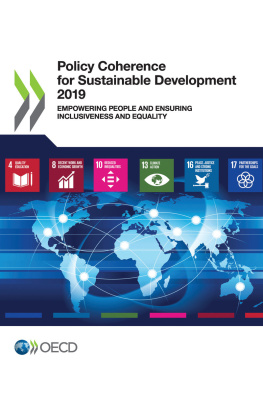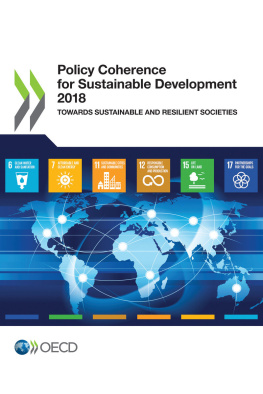Policy Coherence and EU Development Policy
The principle of policy coherence has been the object of a contentious debate in the European Unions external relations, though discussions have been mainly limited to its foreign policy and its ability to speak with one voice in the international arena. Despite being institutionalised in the Treaty of Maastricht, policy coherence for development (PCD), which implies taking into account the needs and interests of developing countries in non-aid policies, failed to make headway in the European Union, remaining the unheeded concern of some NGOs and a small group of Member States. A change of direction occurred in the early 2000s when the European Commission, taking advantage of a number of favourable conditions and using an astute strategy, managed to set an ambitious agenda for the European Union. This volume analyses the linkages between aid and various non-aid policies, namely trade, agriculture, fisheries, security, migration, and the social dimension of globalisation. Its aim is to shed new light on the EUs policy-making process, by looking at the nexus between various policy sub-systems, and on the role that the EU wants to play in the international arena, by looking at the impact of its policies on international development.
This book was published as a special issue of the Journal of European Integration.
Maurizio Carbone is a lecturer in the Department of Politics at the University of Glasgow, where he also directs the Scottish Jean Monnet Centre of European Excellence. His main research interests are on the external relations of the European Union, foreign aid, the politics of international development, as well as European and Italian Politics. Dr. Carbone has published, inter alia, in the Journal of International Development, West European Politics, Review of African Political Economy, Global Governance, and the Journal of European Integration. His latest research book The European Union and International Development: The Politics of Foreign Aid was published by Routledge in late 2007.
Policy Coherence and EU Development Policy
Edited by Maurizio Carbone
First published 2009 by Routledge
2 Park Square, Milton Park, Abingdon, Oxon, OX14 4RN
Simultaneously published in the USA and Canada
by Routledge
711 Third Avenue, New York, NY 10017
Routledge is an imprint of the Taylor & Francis Group, an informa business
2009 Taylor & Francis
First issued in paperback 2013
Typeset in Sabon by Value Chain, India
All rights reserved. No part of this book may be reprinted or reproduced or utilised in any form or by any electronic, mechanical, or other means, now known or hereafter invented, including photocopying and recording, or in any information storage or retrieval system, without permission in writing from the publishers.
British Library Cataloguing in Publication Data
A catalogue record for this book is available from the British Library
ISBN13: 978-0-415-84920-3 pbk
ISBN13: 978-0-415-49533-2 hbk
CONTENTS
1 MAURIZIO CARBONE
2 MARTIN HOLLAND
3 OLE ELGSTRM & JESS PILEGAARD
4 ALAN MATTHEWS
5 CHARLOTTE BRETHERTON & JOHN VOGLER
6 RICHARD YOUNGS
7 SANDRA LAVENEX & RAHEL KUNZ
8 JAN ORBIE & OLUFEMI BABARINDE
MAURIZIO CARBONE
Department of Politics, University of Glasgow, Glasgow, UK
Introduction
The principle of policy coherence has been the object of a contentious debate in the external relations of the European Union. These discussions, however, have been limited mainly to the common foreign and security policy (CFSP), where, without indulging in linguistic sophistry, coherence is used interchangeably with consistency (Krenzler and Schneider 1997; Tietje 1997; Duke 1999; Smith 2001; Gauttier 2004; Nuttall 2005).1 In line with the Single European Act (SEA), which called on the EU to act as a cohesive force in international relations (Article 30.2[d]), the Treaty of Maastricht established that the The Union shall in particular ensure the consistency of its external activities as a whole in the context of its external relations, security, economic, and development policies (Article C).2 While previously greater emphasis was given to the relationship between the member states and the Union, the Treaty of Maastricht gave more prominence to consistency across policies. Moreover, it introduced a single institutional framework to cover the three pillars of the EUs activities, with both the Commission and the Council sharing responsibility in ensuring consistency in the EUs external activities. The aim was that the EU would not only speak with a single voice, but would also be able to assert its identity on the international scene (Duke 1999, Gauttier 2004).
Policy coherence for development (PCD) which according to a widely accepted definition means taking account of the needs and interests of developing countries in the evolution of the global economy (OECD 2003, p. 2) has been largely absent from this debate. This scant attention is rather surprising if one considers that PCD is included in the EUs constitutional charter it was introduced in the Treaty of Maastricht and strengthened in the Treaty of Lisbon, an exceptional case among international donors and that its scope reaches several hard policies, such as trade, agriculture, fisheries. True, very little progress was achieved throughout the 1990s, including within the Development Assistance Committee (DAC), which attempted to further the discussion without much success (Forster and Stokke 1999a). The adoption of the Millennium Development Goals (MDGs), following the Millennium Summit of September 2000, changed the parameters of the debate (Payne 2005, Grieg et al. 2007). Specific targets were set, and the international community was forced to face up to the widening gap between the rich and the poor. This led to a renewed focus by most donors on foreign aid and, in fact, the amount of development assistance increased enormously, from 52 billion in 2000 to 104 billion in 2006 (DAC 2008; see also Riddell 2007). But to achieve the MDGs, it eventually became clear that foreign aid was not enough, but better synergies between aid and non-aid policies needed to be explored. The European Union this time took the lead and, in May 2005, in the context of the Millennium + 5 Summit and as part of a package that included a significant boost in its foreign aid, it agreed on an ambitious agenda on PCD (Council 2005). Even the DAC, which had always been critical of EU development policy, acknowledged that the EU has actively contributed to the growing international consensus on policy coherence (DAC 2007, p. 16), is clear about its desire to help shape a broader international approach (ibid.) and that the Commission has performed its catalytic role in selected areas of policy coherence with the support of a small number of Member States (ibid., p. 19).
This volume analyses the evolution of policy coherence for development from the EUs perspective. The aim is to shed new light on the EUs policymaking process, by looking at the nexus between various policy sub-systems, and on the role that the EU wants to play in the international arena, by looking at the impact of its policies on international development. In fact, the EU, with its 27 member states, not only is the largest provider of foreign aid in the world but it is also the venue in which a large number of policies affecting developing countries are decided. This introductory paper presents the concept of policy coherence for development and the debate since its institutionalization in the early 1990s. The remainder of the volume concentrates on the linkages between aid and various non-aid policies. Following Hollands paper, which provides an analytical overview of the new aid initiatives in the EU and their impact on the global development agenda, the first group of papers deals with three common economic policies namely trade, agriculture and fisheries. Elgstrom and Pilegaard show that the existence of value competition and different priorities within the EU have significantly challenged policy coherence during the negotiations of the Economic Partnership Agreements (EPAs) between the EU and the African, Caribbean and Pacific (ACP) group of states. Matthews argues that, despite successive reforms of the common agricultural policy (CAP), which have reduced the distortions that it generates on world markets, further elimination of export and production subsidies could contribute to higher economic growth in developing countries if these countries did not have to abide by the EUs ever-stringent health and environmental standards. Bretherton and Vogler look at the adoption of the new fisheries partnership agreements, which, despite the promises, demonstrate that the EUs economic interests take precedence over its commitment to promote both sustainable development and poverty eradication. The second group of papers examines socio-political policies. Youngs looks at the commitment to link security and development, claiming that the EU, besides some rhetorical commitments, has achieved little on the balance or direction of causality between these two policy goals. Lavenex and Kunz investigate the EUs migration policy and show that the development-focused approach promoted by various international organizations has not yet fully replaced the EUs dominant security-orientated approach that focuses on the repression of unwanted immigration. Finally, Orbie and Babarinde start from the role of the EU in promoting the social dimension of globalization to demonstrate that the direct impact of the EUs internal social policies has been limited, while an indirect impact has occurred through its trade and development policies.


